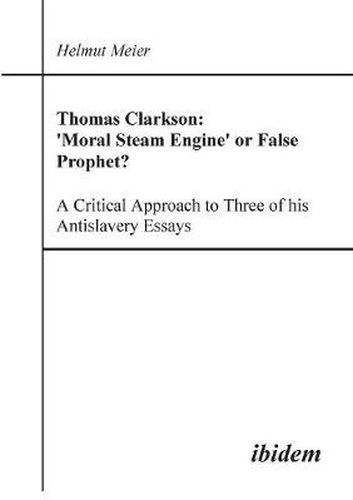Readings Newsletter
Become a Readings Member to make your shopping experience even easier.
Sign in or sign up for free!
You’re not far away from qualifying for FREE standard shipping within Australia
You’ve qualified for FREE standard shipping within Australia
The cart is loading…






This title is printed to order. This book may have been self-published. If so, we cannot guarantee the quality of the content. In the main most books will have gone through the editing process however some may not. We therefore suggest that you be aware of this before ordering this book. If in doubt check either the author or publisher’s details as we are unable to accept any returns unless they are faulty. Please contact us if you have any questions.
Although he put an immense personal effort in the cause of abolishing the British triangle trade, Thomas Clarkson tends to be overshadowed by his better known fellow-abolitionist William Wilberforce. Unjustly so - while Wilberforce acted as the abolitionist movement’s spokesperson in parliament, Clarkson travelled enormous distances through all of England in search of public support for the abolitionist movement. His various essays and pamphlets made Clarkson the ideological mastermind of the British antislavery movement.Until the present day, Both Clarkson and Wilberforce rank among the saints of antislavery hagiography. Many scholars, however, have set out to discuss British antislavery in a critical way. This book examines in depth three of Clarkson’s essays (An Essay on the Slavery and Commerce of the Human Species - 1786; An Essay on the Impolicy of the African Slave Trade - 1788; Thoughts on the Necessity of Improving the Condition of the Slaves in the British Colonies - 1823) and shows changes in style and ideas. Helmut Meier tries to exemplify the links of abolitionist discourse and ideology to such phenomena as the rising of a new capitalist order in the late 18th and early 19th century, the Industrial Revolution, the emerging Imperialism of the period and the connected proliferation of abolitionist ideas around the world.
$9.00 standard shipping within Australia
FREE standard shipping within Australia for orders over $100.00
Express & International shipping calculated at checkout
This title is printed to order. This book may have been self-published. If so, we cannot guarantee the quality of the content. In the main most books will have gone through the editing process however some may not. We therefore suggest that you be aware of this before ordering this book. If in doubt check either the author or publisher’s details as we are unable to accept any returns unless they are faulty. Please contact us if you have any questions.
Although he put an immense personal effort in the cause of abolishing the British triangle trade, Thomas Clarkson tends to be overshadowed by his better known fellow-abolitionist William Wilberforce. Unjustly so - while Wilberforce acted as the abolitionist movement’s spokesperson in parliament, Clarkson travelled enormous distances through all of England in search of public support for the abolitionist movement. His various essays and pamphlets made Clarkson the ideological mastermind of the British antislavery movement.Until the present day, Both Clarkson and Wilberforce rank among the saints of antislavery hagiography. Many scholars, however, have set out to discuss British antislavery in a critical way. This book examines in depth three of Clarkson’s essays (An Essay on the Slavery and Commerce of the Human Species - 1786; An Essay on the Impolicy of the African Slave Trade - 1788; Thoughts on the Necessity of Improving the Condition of the Slaves in the British Colonies - 1823) and shows changes in style and ideas. Helmut Meier tries to exemplify the links of abolitionist discourse and ideology to such phenomena as the rising of a new capitalist order in the late 18th and early 19th century, the Industrial Revolution, the emerging Imperialism of the period and the connected proliferation of abolitionist ideas around the world.